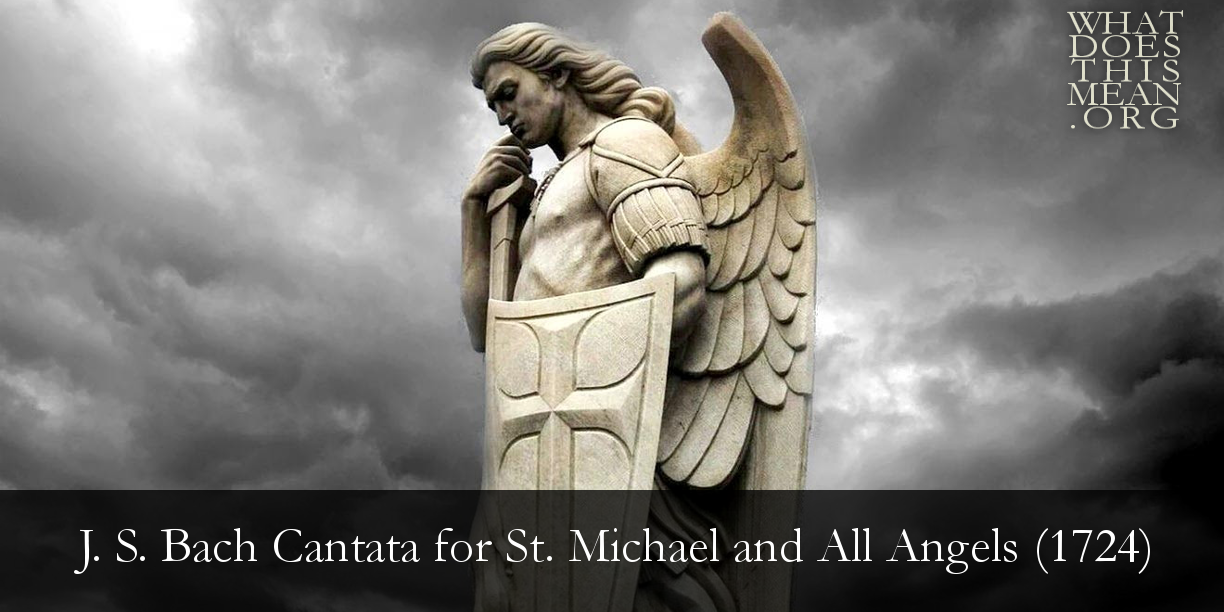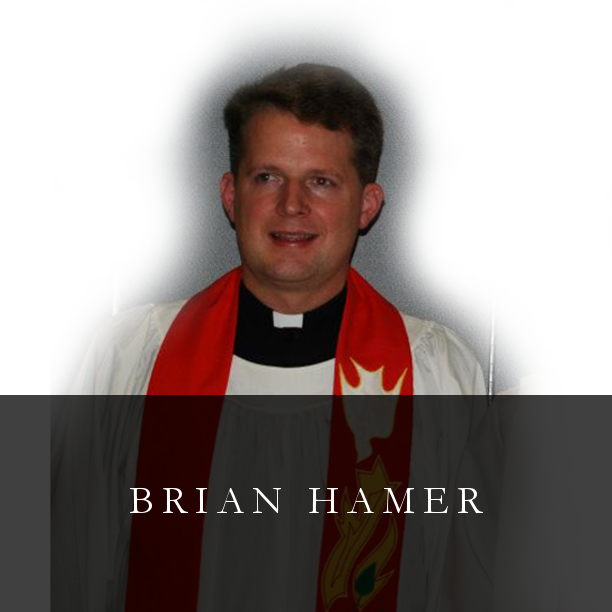Melanchthon’s hymn covers the story of the creation and work of the angels, their end-times battle against Satan, and the response of praise from the church at their victory. Consider a few representative stanzas on each of these three themes from Lutheran Service Book #522, which roughly correspond to the six movements of the cantata:
On angels:
Lord God, to Thee we give all praise,
With grateful hearts our voices raise,
That angel hosts Thou didst create
Around Thy glorious throne to wait.
They shine with light and heav'nly grace
And constantly behold Thy face;
They heed Thy voice, they know it well,
In godly wisdom they excel.
On the battle against Satan:
The ancient dragon is their foe;
His envy and his wrath they know.
It always is his aim and pride
Thy Christian people to divide.
A roaring lion, round he goes,
No halt nor rest he ever knows;
He seeks the Christians to devour
And slay them in his dreadful pow'r.
On the end-times victory and thanksgiving:
But watchful is the angel band
That follows Christ on ev'ry hand
To guard His people where they go
And break the counsel of the foe.
For this, now and in days to be,
Our praise shall rise, O Lord, to Thee,
Whom all the angel hosts adore
With grateful songs forevermore.
Cantata 130 is a chorale cantata, i.e., a cantata based primarily on a pre-existent hymn. In this case, Bach’s unknown librettist used the German edition of Melanchthon’s Latin hymn as a starting point, condensing 11 stanzas of the hymn to make up 6 cantata movements, but without sacrificing the theology of the hymn. The first and last movements of the cantata quote the hymn, while all of the inner movements adapt and paraphrase the hymn. If you have a chance to compare the hymn from www.hymnary.org (search for it by its English title) to the cantata text, you will see how the librettist captures the theology of Melanchthon’s hymn, but in a condensed form.
The chorale cantata form in Cantata 130 is typical of Bach’s cantatas in the mid-1720s: a festive opening chorus based on the chorale, a series of a arias and recitatives in the center, and a closing chorale in its native form. Faithful readers of this column know that I usually highlight the festive choruses and chorales within Bach’s cantatas. This Cantata, however, is probably best heard in one sitting, since it follows the theological progression of one hymn. Moreover, the entire work is only 15 minutes in length, so I invite you to take the time to watch the entire performance on period instruments, courtesy of the Netherlands Bach Society.
- After an orchestral ritornello that Gardiner describes as “a tableau of the angels on parade” (Castle of Heaven, p. 457), the choir enters with the first stanza of the chorale (see the first stanza quoted above) in the soprano and counterpoint in the lower voices. Do you recognize the melody? It will reappear in movement 6, lending a continuity to the work and perhaps inviting the congregation at Leipzig to join in the two final chorale stanzas in the last movement.
- This brief alto recitative (sung here by a countertenor) draws a unique and compelling parallel between the angels gathering around God’s throne for worship and gathering around God’s little flock to guard and protect it, similar to the following petition in the Collect for Michaelmas: “grant that, as Thy holy angels always do Thee service in heaven, so by Thine appointment they may succor and defend us on earth” (The Brotherhood Prayer Book, p. 528).
- John Eliot Gardiner says that in this bass solo Bach evokes “two superpowers squaring up to one another,” the angels represented by three dazzling trumpets and the evil foe, embodied in the kettledrums and continuo. “Probably no composer before or since has written such a profusion of celestial music for mortals to play and sing – and no one could show off a trio of trumpets to such dazzling effect as Bach” (Castle of Heaven, pp. 457-458).
- This recitative for soprano and tenor draws upon the narrative of Daniel, Shadrach, Meshack, and Abednego (Daniel 3), who were thrown into the fiery furnace for refusing to worship the false gods of Babylon, and applies to narrative to angelic protection for the believer: "If there the embers in Babylon's furnace no injury can do, then believers can let a song of thanks be heard; then the angels' help appears in danger, even today."
- The tenor sings, "Grant, O Prince of the Cherubim that this heroic lofty host evermore thy believers might serve; that they would carry them up to thee in heaven in Elijah's chariot." Nicholas Anderson writes, “The text is an invocation to Christ, Prince of Cherubim, whose music—light-footed, airy, and dance-like in the manner of a gigue—is far removed from the scene of the earlier battlefield” (Oxford Composers Companions: J. S. Bach, p. 217). The supplication for us to ride in Elijah’s chariot to heaven recalls the final stanza of the alternative Hymn of the Day for Michaelmas in Leipzig, “Lord, let at last Thine angels come, To Abr’ham’s bosom bear me home, That I may die unfearing” (Lutheran Service Book 708.3).
- The chorus sings the final two stanzas of the chorale (see the final text quoted above). Do you recognize the melody? It is known as “Old Hundredth,” originally associated with Psalm 100 and modified to triple meter for this movement.
Who in His great war have striven / With the legions of the lost;
Equal praise in highest heaven / To the Son and Holy Ghost. Amen.
(Brotherhood Prayer Book, p. 561)



 RSS Feed
RSS Feed
